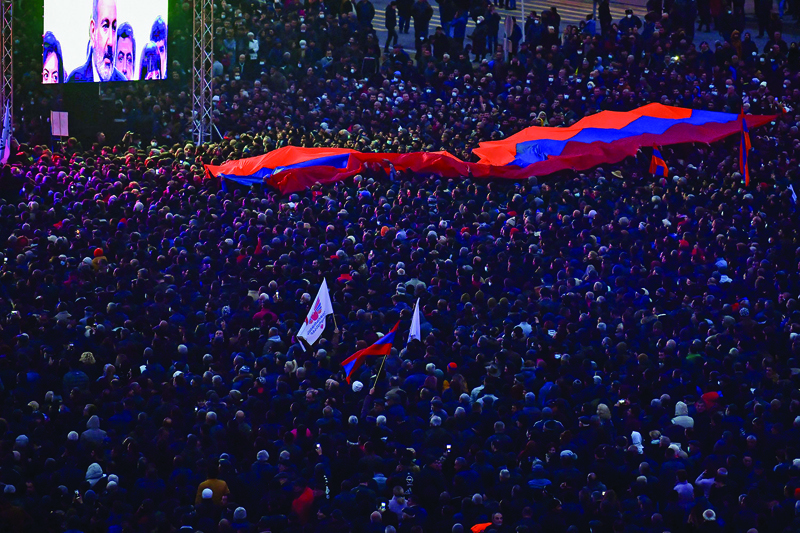 YEREVAN: Supporters of Armenian Prime Minister Nikol Pashinyan listen to his speech during a rally at Republic Square in downtown Yerevan.-AFP
YEREVAN: Supporters of Armenian Prime Minister Nikol Pashinyan listen to his speech during a rally at Republic Square in downtown Yerevan.-AFP
YEREVAN, Armenia: Anger caught in Mari Hovhannisyan's throat as she demanded Armenia's leadership resign, more than three months on from a disastrous war that saw swathes of territory lost to Azerbaijan. "I am six months pregnant but I had to come out," the 36-year-old told AFP, directing her fury at her country's Prime Minister Nikol Pashinyan. "I am against this regime, against the betrayer who sold out our land, our flag, our nation, everything. He should be in jail, he can't remain in place." Around her in Armenia's capital Yerevan several thousand protesters, waving the national flag, echoed her contempt.
But at the same time, just over a kilometer away on Monday evening, the man they are targeting was defiantly plotting his own way forward in front of a far larger crowd of supporters on the city's main square. "If the parliamentary opposition agrees to early elections, we will agree to early elections," Pashinyan shouted through a megaphone to the chanting throng. "Only the people can decide who will remain in power." The standoff in Armenia is the latest stage of a political crisis fuelled by the fallout of the conflict that erupted last year over the disputed Nagorno-Karabakh region.
After six weeks of violence that claimed around 6,000 lives on all sides, a Moscow-brokered ceasefire agreement was signed, handing over significant territory to Azerbaijan and allowing for the deployment of Russian peacekeepers. For Armenians it was a devastating reversal from a first war in the early 1990s-upending their decades-long narrative from victors into vanquished in under two months.
"Too much of Armenia, including the military and the government, is still in a state of denial," said Richard Giragosian, director of the Yerevan-based Regional Studies Center think-tank. "This is why, like the five or seven stages of grief, we can't go on to mourn or grieve-because we are still in the state of denial."
Early elections?
Charting a way out of the political deadlock looks tricky for this south Caucasus republic of three million people. Pashinyan, a charismatic 45-year-old ex-journalist who swept to power in peaceful protests in 2018, insists he is ready for early elections-but there is no clear agreement or timeframe. Last week the prime minister accused the military of attempting a coup when the general staff backed calls for his resignation. Now Pashinyan is squaring off with President Armen Sarkisian, whose role is largely symbolic, after the head of state refused to sign off on the sacking of the military chief.
Analyst Giragosian said the best way forward is for Pashinyan to seek a new mandate at elections-but that the premier is wary of handing over to any caretaker in the interim and risking the huge majority he holds in parliament. "In the event of a free and fair election, Pashinyan's party would likely secure a reduced but still working majority," Giragosian said. "The opposition is widely unpopular and deeply discredited. It's a lack of an alternative candidate and credible rival that tends to strengthen Pashinyan's position."
Old guard strikes back?
A key part of the opposition appears to come from Armenia's former leadership, ousted by Pashinyan in the country's "Velvet Revolution" of 2018. Critics say the populist leader has failed to make genuine reforms after the rare democratic breakthrough for his ex-Soviet homeland. But Pashinyan's supporters accuse the old guard of using the losses during the war as a pretext to gain retribution. "We don't want those who robbed Armenia before to return," 60-year-old English teacher Aida Ghevondyan told AFP. "They've decided that Pashinyan is guilty for the war-but people know those who were in charge before are guilty for getting rich and not building up the army."
While the political sparring rumbles forward, many in Armenia just seem to be turned off by the wrangling as the country struggles to adapt to the new reality after last year's conflict. "For most of the people, there is apathy, fatigue, reluctance and a lack of faith in both of the sides," said Alexander Iskandaryan, the director of Yerevan's Caucasus Institute. And however the situation plays out, the rancour and divisions look set to drag on. "The turbulence will continue under any scenario-there is no doubt about that," Iskandaryan said. - AFP




